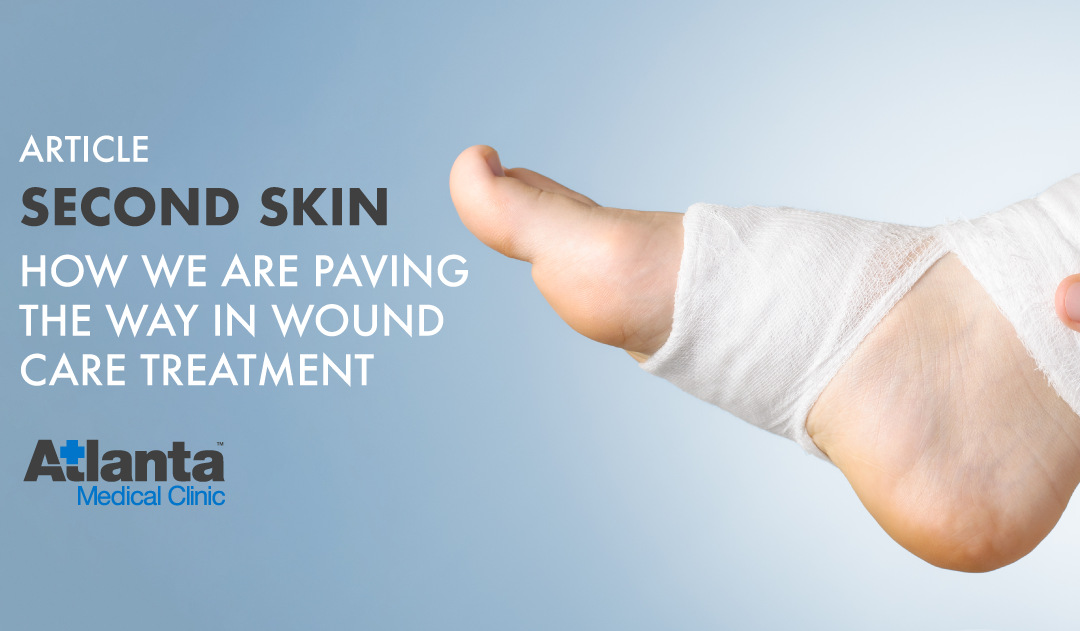The reason why Atlanta Medical Clinic exists is simple: the founders wanted to build a place of healing and empowerment, and a world-class treatment center for our patients. Over the years, we have expanded our services to include different forms of minimally-invasive treatments and therapies to help our patients get relief from pain and get back to the activities they love. The next frontier for Atlanta Medical Clinic is expanding into the arena of diabetic wound care – a potentially life-saving treatment supporting the diabetic patients in our community.
“My father had diabetes,” says Dr. Timothy Dembowski, Clinic Director at Atlanta Medical Clinic. “I saw personally the unique set of challenges that the condition presented him with daily life. Now I want to be able to help others through our vein, neuropathy, and skin graft treatment programs,” he says. “We have the technology, experience, and compassion to help people.”
Diabetes and the skin
Individuals dealing with diabetes not only have to monitor their blood sugar or insulin levels, they have a myriad of other symptoms to look out for.
Because the disease can cause more damage to the peripheral nerves in the extremities, neuropathy is also prevalent with diabetic patients. At Atlanta Medical Clinic, we provide a multidisciplinary approach to treat neuropathic pain, including nerve blocking, cold laser therapy, and H-Wave therapy, in addition to minimally-invasive corrective procedures on veins.
“In many cases, patients with diabetes often have wounds that are slow to heal because their veins aren’t operating sufficiently to circulate the blood and nutrients the way they need to,” says Dr. Dembowski.
Oftentimes, patients require these corrective vein treatments in order to help improve blood flow, and as a result, wound healing times.
The dangers of diabetic ulcers
Not only is it very uncomfortable, but having an open wound that takes weeks, months, or even years to heal can actually become fatal for a diabetic patient.
Startling research has shown diabetic foot ulcers carry high amputation and mortality rates.
“Five-year mortality rates after new-onset diabetic ulceration have been reported between 43% and 55% and up to 74% for patients with lower-extremity amputation. These rates are higher than those for several types of cancer including prostate, breast, colon, and Hodgkin’s disease.”
-
Source: Podiatry Medical Association
With numbers as aggressive as these, it’s clear that more attention needs to be drawn towards diabetic patients with slow-healing wounds. If they can get timely treatment, wounds cannot turn into ulcers, which may avoid the need for amputation down the road.
The Future
Atlanta Medical Clinic has partnered with Organogenesis, a leader in non-surgical medicine that has developed the first-ever FDA-approved bio-engineered skin grafts. These technologies have been used to treat non-healing diabetic foot and venous leg ulcers in patients where other therapies failed.
Depending on the size and severity of the wound, many patients can expect to see successful results over a 12-week period. Each session involves a new application of the graft to the affected area, only lasting a few minutes.
“We are pleased to be able to offer these specialized services in diabetic wound care,” says Dr. Dembowski. “Our clinic is the only in the area to offer these healing therapies in a relaxing, non-hospital environment.”
If you are concerned with tingling in the lower extremities, have diabetes, or experience wounds and ulcers on your feet that take an age to heal, contact the team at Atlanta Medical Clinic to book a consultation today.

